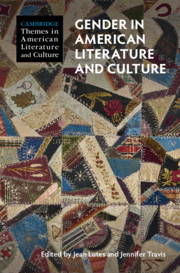Book contents
- Gender in American Literature and Culture
- Cambridge Themes in American Literature and Culture
- Gender in American Literature and Culture
- Copyright page
- Contents
- Contributors
- Acknowledgments
- Introduction
- Part I Intimacies
- Chapter 1 The Price of Freedom
- Chapter 2 Post-Reproductive Female Sexuality and the Early American Novel
- Chapter 3 The Effeminate Man in Nineteenth-Century America
- Chapter 4 Rereading Puritan Masculinity through Trans Theory
- Chapter 5 “Unbounded Grief”
- Chapter 6 Rethinking Reproductive Freedom through Transpacific Narratives
- Chapter 7 Slow Emergency
- Part II Aggressions
- Part III New Directions
- Bibliography
- Index
Chapter 1 - The Price of Freedom
Racialized Female Desire in Early America
from Part I - Intimacies
Published online by Cambridge University Press: 01 April 2021
- Gender in American Literature and Culture
- Cambridge Themes in American Literature and Culture
- Gender in American Literature and Culture
- Copyright page
- Contents
- Contributors
- Acknowledgments
- Introduction
- Part I Intimacies
- Chapter 1 The Price of Freedom
- Chapter 2 Post-Reproductive Female Sexuality and the Early American Novel
- Chapter 3 The Effeminate Man in Nineteenth-Century America
- Chapter 4 Rereading Puritan Masculinity through Trans Theory
- Chapter 5 “Unbounded Grief”
- Chapter 6 Rethinking Reproductive Freedom through Transpacific Narratives
- Chapter 7 Slow Emergency
- Part II Aggressions
- Part III New Directions
- Bibliography
- Index
Summary
This chapter looks to literary and legal narratives from the seventeenth to the twenty-first century to trace how women’s bodies function as a site where the definitions of slavery and freedom, person, and property, have been continually refined. From the settler era until well into the twentieth century, American readers were drawn to stories – both in law and in literature – that sought to distribute varieties of female unfreedom along a racialized spectrum ranging from private property to articles of commerce. As these stories progress, and insistence on clear racial distinctions becomes ever more explicit, the tropes of prison and pregnancy emerge as two means of rendering women’s capacity to exert her private will a matter requiring public discipline.
- Type
- Chapter
- Information
- Gender in American Literature and Culture , pp. 23 - 36Publisher: Cambridge University PressPrint publication year: 2021

